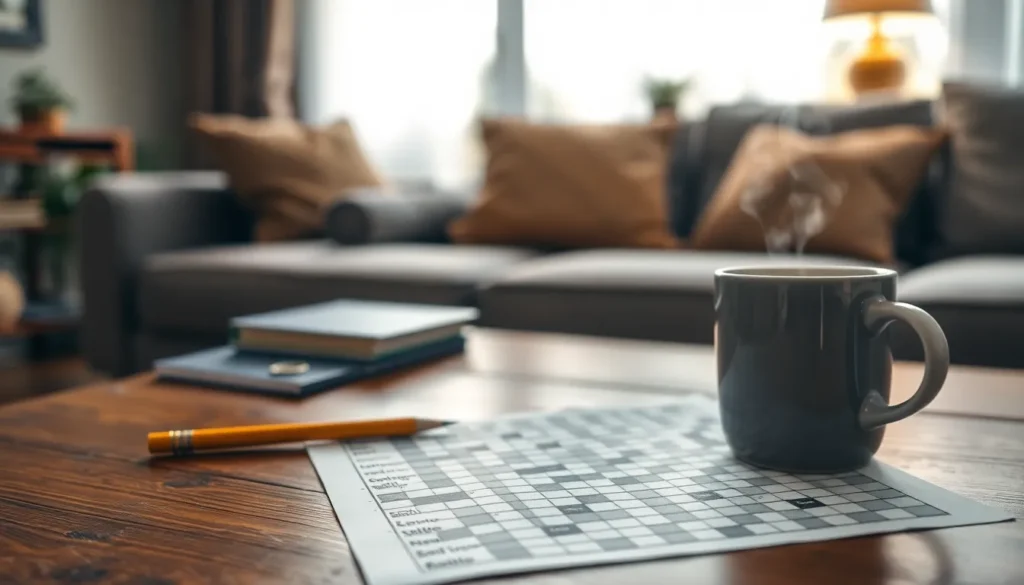Crossword puzzles can be a delightful brain workout, but they can also lead to moments of utter frustration, especially when a clue leaves you scratching your head. If you’ve ever found yourself stumped by the phrase “clear of blame or suspicion,” you’re not alone. This clue can feel like a riddle wrapped in an enigma, challenging even the most seasoned puzzlers.
Table of Contents
ToggleUnderstanding Crossword Clues
Crossword clues serve as essential hints that guide solvers toward their answers. They often contain a mix of wordplay, definitions, and sometimes cryptic elements, making them intriguing yet challenging. The clue “clear of blame or suspicion” exemplifies how wording can trip up even seasoned crossword enthusiasts.
Decoding such clues requires an understanding of language nuances. Commonly, a clue can lead solvers to synonyms or related phrases. For instance, “clear of blame or suspicion” hints at words that convey innocence. Many crossword enthusiasts find terms like “absolve” or “exonerate” fitting solutions.
Recognizing patterns enhances solving strategies. Clue length usually corresponds to the word count needed for the answer. Cross-referencing with intersecting answers often clarifies the path to the solution. Once letters are in place, the broader context of the crossword grid can illuminate possibilities.
Exploring synonyms further enriches the experience. Solvers may consider alternatives such as “clear,” “innocent,” or “blameless.” These words share contextual relevance while tapping into thematic elements in many puzzles.
Engaging with crossword clues fosters vocabulary and mental agility. Building familiarity with common phrases and variations leads to efficiency. Over time, routine practice transforms initial frustration into an enjoyable challenge, while expanding linguistic knowledge.
The Phrase “Clear of Blame or Suspicion”

The phrase “clear of blame or suspicion” conveys a state of innocence or freedom from allegations. It often arises in discussions about accountability or guilt.
Origin and Meaning
The origin of this phrase lies in the legal context, where absolution occurs in relation to accusations. Historically, to be clear of blame meant to find oneself exonerated from wrongdoing. Language users often associate the phrase with feelings of relief and vindication. Understanding its depth enhances its application in everyday usage, especially in contexts involving judgment. The Latin term “absolvere” translates to “set free,” further underscoring the phrase’s connotation of liberation from guilt.
Usage in Crossword Puzzles
In crossword puzzles, the phrase “clear of blame or suspicion” appears as a clue that points to synonyms like “absolve” or “exonerate.” Experienced solvers recognize that clues often hint at various contexts, requiring creative thinking. This clue length may vary, adding another layer of complexity for solvers. Crossword enthusiasts explore intersections, helping uncover letters that assist in solving adjacent clues. Understanding the subtleties of such phrases can significantly enhance the solving experience while expanding vocabulary and cognitive skills.
Common Answers to the Clue
The clue “clear of blame or suspicion” often leads solvers to several synonymous terms. Understanding these can simplify the puzzle-solving process.
Popular Synonyms
Common answers include absolve and exonerate. Each term conveys a sense of innocence. Words like vindicate and acquit also appear frequently, highlighting different contexts in which someone can be cleared of wrongdoing. Clear serves as a versatile option, allowing for broader interpretations. Familiarity with these synonyms aids solvers in identifying the correct answer quickly.
Variations in Different Puzzles
Different crossword puzzles may present this clue with a range of answer lengths. A short-form clue could lead to a straightforward term like clear. Longer puzzles might require exonerate, demanding more thought from solvers. Some puzzles use absolve to ensure it fits specific word counts. Variability exists in difficulty levels as well, prompting players to think creatively. Cross-referencing intersecting clues often helps reveal the correct answers for these variations.
Tips for Solving Crossword Clues
Crossword puzzles can challenge even the most seasoned solvers. To navigate clues like “clear of blame or suspicion,” consider effective strategies that enhance your problem-solving skills.
Enhancing Vocabulary
Expanding vocabulary proves beneficial for tackling crossword puzzles. Familiarity with synonyms like “absolve” or “exonerate” simplifies the process. Engaging with word lists or flashcards strengthens recall ability. Reading diverse materials, including newspapers, books, and articles, introduces new terms. Regularly practicing with crossword apps or websites further reinforces familiarity with common answers. Discovering patterns in word usage increases the likelihood of remembering synonyms. Through consistent exposure to varied language, solvers build a stronger vocabulary that aids in puzzle-solving.
Strategies for Analysis
Effective analysis of crossword clues enhances overall solving efficiency. Start by identifying clue types, such as definitions or wordplay. Consider the clue length, as it often indicates the answer’s structure. Break down complex phrases to reveal potential keywords. Assess intersecting words, as they frequently provide valuable letters. Use elimination techniques when uncertain; discarding impossible options streamlines decision-making. Staying flexible with thinking often leads to breakthroughs, especially when familiar terms appear. Regular practice cultivates analytical skills, boosting confidence in solving future puzzles.
Mastering clues like “clear of blame or suspicion” can elevate one’s crossword-solving skills. By understanding the nuances of language and exploring synonyms such as “absolve” and “exonerate,” solvers can navigate challenges with greater ease.
Regular practice and exposure to diverse vocabulary not only enhance problem-solving abilities but also make the experience more enjoyable. Engaging with different puzzle types and employing strategic techniques will undoubtedly lead to improved confidence and efficiency.
As solvers continue to tackle these intriguing clues, they’ll find that the journey from confusion to clarity is what truly enriches the crossword experience.




